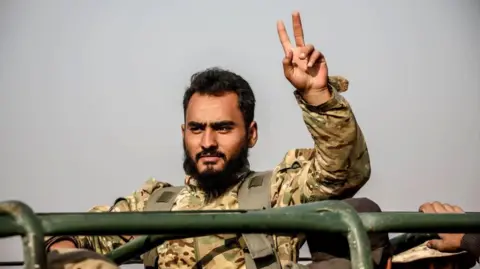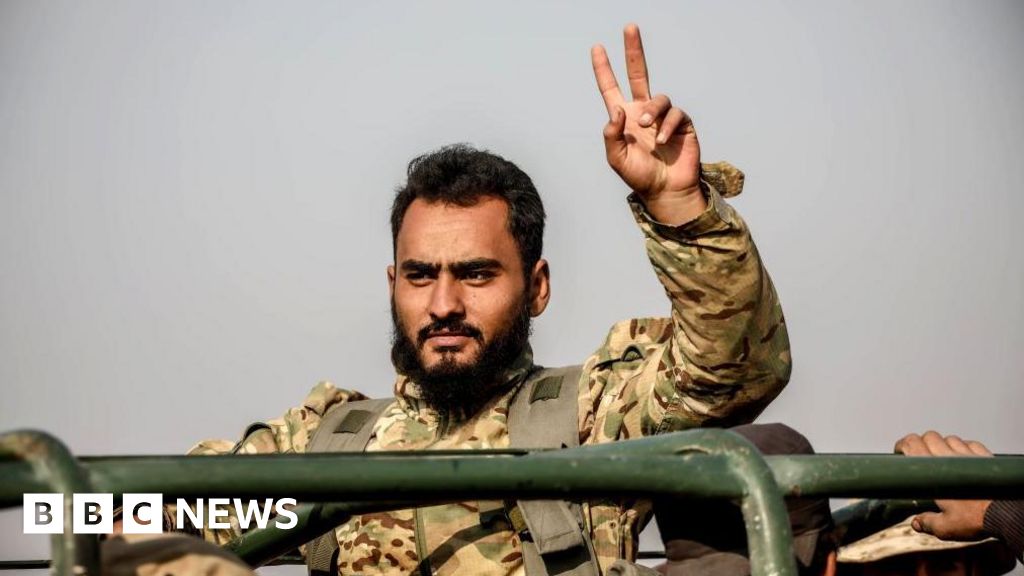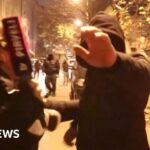 Getty Images
Getty ImagesThe leader of the Islamist group leading an insurgency in Syria says his forces have taken full control of Homs – the country’s third largest city.
Abu Mohammed al-Golani called it a “historic victory” and urged his followers not to harm those who surrendered. The BBC has not yet been able to verify the claims.
The Syrian Defence Ministry said the reports were false and that the situation in Homs was “stable and safe”.
Meanwhile, rebel forces are reported to be closing in on Damascus, as the Syrian army says it is boosting its deployment of forces around the capital.
According to the UK-based war monitor, the Syrian Observatory for Human Rights (SOHR), anti-Assad fighters entered the city of Homs and “took control of several neighbourhoods”.
Rebel commander Hasan Abdul Ghani announced the “complete liberation” of Homs and wrote on X that more than 3,500 inmates had been freed from prison.
The fall of the city to rebel forces would be another major blow to Syrian President Bashar al-Assad as it would isolate Damascus, cutting the city off from the coastal heartland of his family’s minority Alawite sect.
It would also be a symbolic victory, as Homs served as the opposition’s stronghold in the early days of the civil war, which broke out in 2011.
Ghani said that efforts were continuing to “liberate the entire Damascus countryside, and our eyes are watching the capital, Damascus”.
An unnamed US official has told the BBC’s US partner, CBS News, that the city appears to be “falling suburb by suburb to the rebels”.
Video footage posted on social media showed demonstrators chanting and cheering as a statue of President Assad’s late father, Hafez al-Assad, is toppled in the southern suburb of Jeramana.
Damascus residents that the BBC spoke to described the uncertainty there.
“We are afraid because we really don’t know what’s going to happen,” journalist Zaina Shahla said. “Nobody wants to see fighting in Damascus.”
Rim Turkmani, director of the Syria Conflict Research Programme at the London School of Economics, said her sister was still in the city and had reported that supplies were running low and ATMs were running out of cash.
The whereabouts of the president are the subject of speculation, with suggestions he may have fled the country. His office has denied all such reports, saying Assad is still at work in Damascus – but there has been no sign of him.
Reports that rebels have seized control of Homs come just over a week since they launched their lightning offensive – the biggest against the Syrian government in years, which has exposed the weakness of the country’s military.
The government has also lost control of the northern cities of Hama and Aleppo, and armed groups in the south say they have taken control of Deraa and Suweida, close to the border with Jordan.
More than 800 people are estimated to have been killed in the fighting, according to the SOHR.
According to the UN, at least 370,000 people have been displaced so far – with many, including Alawites, fleeing the rebels’ approach.
The UN said the fighting was also “worsening an already horrific situation for civilians in the north of the country”.
The UN’s special envoy for Syria, Geir Pederson, on Saturday told the BBC he believed a negotiated way out of Syria’s escalating crisis was still possible, but he also warned it could also go terribly wrong once more in Syria.
Pederson said that various countries were in contact with the rebels and had stressed the need to avoid chaos and bloodshed.
He spoke after attending a meeting in Qatar with representatives of five Arab countries, as well as Iran, Turkey and Russia – the three major outside powers involved in Syria.
In a joint statement, the group said the current crisis posed a threat to regional and international security.



